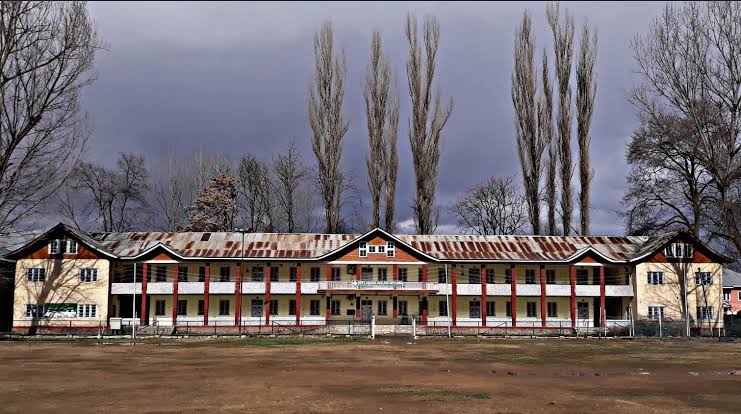It’s a crisp morning in Anantnag, and the sprawling campus of Government Degree College Boys is buzzing with energy. Students huddle in ICT-enabled classrooms, debating climate change solutions, while across the quad, a group fine-tunes a documentary film for a national competition. This isn’t just a college—it’s a crucible of ambition, a place that has churned out civil servants, scholars, and artists since 1950. Yet, despite its storied legacy and relentless pursuit of excellence, it remains shackled by its current status. It’s time to unshackle it. Declaring Government Degree College Boys Anantnag a deemed university isn’t just an upgrade—it’s a moral imperative for South Kashmir’s future.
A Legacy Begging for Elevation
Walk through the college’s gates, and you’re greeted by a history that hums with pride. Founded as an intermediate college in Anantnag’s bustling heart, it later moved to a site once graced by a Maharaja’s rest house. Today, it stands as a testament to resilience, recognized by the University Grants Commission (UGC) with 2(f) and 12(B) status in 1972 and anointed a “College with Potential for Excellence” in 2016. Its academic credentials gleam: NAAC grades of B+ (2005), A (2012), and B+ (2021), three postgraduate programs—M.Sc. Chemistry, M.Com, and M.Sc. IT—and seven new undergraduate courses. Add to that a trophy case brimming with accolades, from the Best Geo-Spatial Award in September 2024 to first-place finishes in NCC and cultural showdowns like the University of Kashmir’s Sonzal festival.
But legacy alone doesn’t cut it in 2025. “We’re bursting at the seams,” says Professor Bilal Ahmad, head of the Chemistry Department, his voice tinged with urgency. “Our students are ready for PhDs, for cutting-edge research on climate change and IT. But without deemed status, we’re stuck offering crumbs when they deserve a feast.” He points to a lab where students analyze soil samples from flood-prone areas—a project with real-world stakes—yet lack the resources to scale it up.
Voices from the Ground
The students feel it too. Take Aijaz Mir, a final-year M.Sc. IT student whose app to track local crop yields won a state-level hackathon last month. “I want to take this further, maybe collaborate with IITs or global tech firms,” he says, leaning against a desk cluttered with code-filled notebooks. “But as a college, we don’t have the clout or autonomy to make that happen. Deemed status would open those doors.”
Then there’s Shazia Akhtar, a painter whose work earned the college a top prize at a Gandhi Jayanti celebration in 2024. “This place gave me a canvas to dream,” she says, brushing a strand of hair from her face as she sketches in the art room. “But imagine what we could do with more freedom—interdisciplinary courses, international exhibitions. We’re ready.”
Even alumni are clamoring for change. Mohammad Ashraf, a 1990s graduate now posted as a senior bureaucrat in Srinagar, recalls, “This college taught me discipline and grit. Deemed status would’ve pushed me to a PhD, maybe a global career. Today’s kids deserve that shot.”
Tarigami’s Lone Crusade
The proposal landed in the Jammu and Kashmir Assembly with a thud, thanks to CPI(M) stalwart Mohammad Yousuf Tarigami. “Anantnag’s youth are its goldmine,” he thundered in a recent session, his gravelly voice cutting through the chamber. “Granting deemed status to this college is about unlocking that potential—for education, for jobs, for pride. Who will stand with me?” His plea was met with a chilling silence from other MLAs, a mute chorus that’s become all too familiar when Anantnag’s development is on the table.
That silence stings. “Tarigami’s the only one with guts,” snaps Rifat Ara, a local shopkeeper whose son studies at the college. “The rest of these MLAs—they sit on their hands while our kids’ futures hang in limbo. Where’s their spine?” She’s not wrong. Anantnag’s educational and economic stagnation has festered under a parade of lawmakers who’ve offered little beyond platitudes. Tarigami’s push is a lifeline—why aren’t they grabbing it?
The Stakes Are Real
Picture this: a deemed university in Anantnag, with research hubs tackling Kashmir’s pressing issues—flood mitigation, sustainable agriculture, digital connectivity. The college already has the bones for it: a sprawling campus, PhD-holding faculty who’ve published in top journals, and skill courses like vermicompost and welding technology that marry academia with livelihoods. “We’ve got welders training here who now run workshops in Pulwama,” says Dr. Naseer Iqbal, a faculty member overseeing skill programs. “Imagine scaling that up with university resources.”
Autonomy would be the game-changer—freedom to craft curricula, launch doctoral programs, and forge global partnerships. Funded by government grants and poised to tap industry collaborations, the college could become a self-sustaining engine of growth. But without political will, it’s a pipe dream.
A Plea to South Kashmir’s Leaders
Here’s the rub: South Kashmir’s MLAs hold the key. From Kulgam to Shopian, their support could sway the UGC and Ministry of Education. “We’re begging them to see the bigger picture,” says Principal Farooq Ahmad, his tone measured but firm. “This isn’t just about us—it’s about their constituents, their legacy.” With the Education Minister hailing from South Kashmir, the stars might align. “She knows this region’s pulse,” Ahmad adds hopefully. “We trust she’ll back us.”
But hope isn’t enough. Aijaz, Shazia, and thousands like them need action. Tarigami’s shown the way; it’s time for the silent MLAs to step up. Deemed status for Government Degree College Boys Anantnag isn’t a favor—it’s a debt owed to a region too long overlooked. South Kashmir’s future is knocking. Will its leaders answer?




